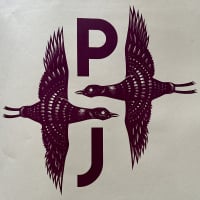Jack Kerouac
Comments
-
I heart Scout Niblett wrote:jecica wrote:I read my first Kerouac book recently, On the Road and it drove me crazy. It was the unedited version with no paragraphs or punctuation.
don't read 'Requiem For A Dream' if ya don't like that haha
aaah selby.... what a genius. 8-)hear my name
take a good look
this could be the day
hold my hand
lie beside me
i just need to say0 -
Just watched "Big Sur"…. I liked it, if your familiar with the book then I think you'll dig this movie. Does a good job painting a visual picture of the words he wrote/feeling during that period…. Definitely liked this one better then "On the Road" movie.
http://www.youtube.com/watch?v=3w71t2lFXDUPost edited by Attaway77 on1998 Dallas (7/5) 2006 San Fran (7/15,7/16) 2009 San Fran (8/28) 2010 Bristow (5/13) NY (5/21) 2011 Alpine Valley (9/3,9/4)
2012 Missoula (9/30) 2013 Chicago (7/19) Pittsburgh (10/11) Buffalo (10/12) Baltimore (10/27) Dallas (11/15)
2014 Austin (10/12) Memphis (10/14) St. Paul (10/19) Milwaukee (10/20) Denver (10/22)
2016 Ft. Lauderdale (4/8) Miami (4/9) Hampton (4/18) Philly (4/28,4/29) NY (5/1,5/2) 2018 Seattle (8/10) Missoula (8/13) 2022 Nashville (9/16)
E.V. - 2008 Berkeley (4/8) 2012 Austin (11/9,11/12)
Temple of the Dog - 2016 Upper Darby0 -
Attaway77 wrote:Just watched "Big Sur"…. I liked it, if your familiar with the book then I think you'll dig this movie. Does a good job painting a visual picture of the words he wrote/feeling during that period…. Definitely liked this one better then "On the Road" movie.
Oh man, if only I could be transported by to the late 40's through early 60's and be in Big Sur...the people who hung out there-- Jack Kerouac, Henry Miller, Robinson Jeffers, John Steinbeck, Edward Weston, Richard Brautigan, Hunter S. Thompson, Lawrence Ferlinghetti, Orson Wells, Rita Hayworth, Elizabeth Taylor and Richard Burton... wow!"It's a sad and beautiful world"-Roberto Benigni0 -
brianlux wrote:Attaway77 wrote:Just watched "Big Sur"…. I liked it, if your familiar with the book then I think you'll dig this movie. Does a good job painting a visual picture of the words he wrote/feeling during that period…. Definitely liked this one better then "On the Road" movie.
Oh man, if only I could be transported by to the late 40's through early 60's and be in Big Sur...the people who hung out there-- Jack Kerouac, Henry Miller, Robinson Jeffers, John Steinbeck, Edward Weston, Richard Brautigan, Hunter S. Thompson, Lawrence Ferlinghetti, Orson Wells, Rita Hayworth, Elizabeth Taylor and Richard Burton... wow!
It's amazing how people don't really look back at a lot of these authors/writers/poets/etc and realize what great stuff they were writing. Of course everybody knows about HST the most, he was more visible and vocal and became more famous in his day and after, but those before him were just as fucked up on drugs and life like the next person which led to some great stuff published, just a different era on how to express it...1998 Dallas (7/5) 2006 San Fran (7/15,7/16) 2009 San Fran (8/28) 2010 Bristow (5/13) NY (5/21) 2011 Alpine Valley (9/3,9/4)
2012 Missoula (9/30) 2013 Chicago (7/19) Pittsburgh (10/11) Buffalo (10/12) Baltimore (10/27) Dallas (11/15)
2014 Austin (10/12) Memphis (10/14) St. Paul (10/19) Milwaukee (10/20) Denver (10/22)
2016 Ft. Lauderdale (4/8) Miami (4/9) Hampton (4/18) Philly (4/28,4/29) NY (5/1,5/2) 2018 Seattle (8/10) Missoula (8/13) 2022 Nashville (9/16)
E.V. - 2008 Berkeley (4/8) 2012 Austin (11/9,11/12)
Temple of the Dog - 2016 Upper Darby0 -
Attaway77 wrote:brianlux wrote:Attaway77 wrote:Just watched "Big Sur"…. I liked it, if your familiar with the book then I think you'll dig this movie. Does a good job painting a visual picture of the words he wrote/feeling during that period…. Definitely liked this one better then "On the Road" movie.
Oh man, if only I could be transported by to the late 40's through early 60's and be in Big Sur...the people who hung out there-- Jack Kerouac, Henry Miller, Robinson Jeffers, John Steinbeck, Edward Weston, Richard Brautigan, Hunter S. Thompson, Lawrence Ferlinghetti, Orson Wells, Rita Hayworth, Elizabeth Taylor and Richard Burton... wow!
It's amazing how people don't really look back at a lot of these authors/writers/poets/etc and realize what great stuff they were writing. Of course everybody knows about HST the most, he was more visible and vocal and became more famous in his day and after, but those before him were just as fucked up on drugs and life like the next person which led to some great stuff published, just a different era on how to express it...
Oh, for sure. Really an amazing, fertile, creative period. Yeah, these people paved the way for HST just as F. Scott Fitzgerald (just finished reading his heart-breaking Tender is the Night), D. H. Lawrence, Virginia Woolf, Thomas Wolfe, Hemingway, Gertrude Stein, Jack London, and Dostoyevsky, Tolstoy and others paved the way for them. And most of them were also fucked up on booze and drugs and life. The "tortured genius" thing is overstated sometimes but maybe only because it's so true."It's a sad and beautiful world"-Roberto Benigni0 -
Oh, but then there's Harper Lee. Pretty much a together person, one book only, out the park. Fucking amazing!"It's a sad and beautiful world"-Roberto Benigni0
Categories
- All Categories
- 149.2K Pearl Jam's Music and Activism
- 110.3K The Porch
- 286 Vitalogy
- 35.1K Given To Fly (live)
- 3.5K Words and Music...Communication
- 39.4K Flea Market
- 39.4K Lost Dogs
- 58.7K Not Pearl Jam's Music
- 10.6K Musicians and Gearheads
- 29.1K Other Music
- 17.8K Poetry, Prose, Music & Art
- 1.1K The Art Wall
- 56.8K Non-Pearl Jam Discussion
- 22.2K A Moving Train
- 31.7K All Encompassing Trip
- 2.9K Technical Stuff and Help


